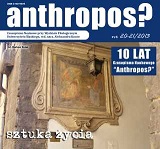Sztuka życia - sprzeciwu - zaangażowania. O pojęciu ludzkiej suwerenności w rozważaniach Gernota Böhmego
The art of life - objection - commitment. The concept of human sovereignty in Gernot Böhme’s considerations
Author(s): Katarzyna SzkaradnikSubject(s): Philosophy
Published by: Instytut Nauk o Kulturze i Studiów Interdyscyplinarnych - Wydział Filologiczny - Uniwersytet Śląski
Keywords: The art of life; anthropology in pragmatic perspective; ethics; values; human nature; philosophical anthropology; experience; subjectivity
Summary/Abstract: May philosophers in so called late modernity, the epoch after the fall of grand narratives, not only diagnose societies' and the human individual's situation, but also formulate for people the aims for the future which would mean a good life? In this draft the authoress draws closer the conception of Gernot Böhme, a continuator of the classics of philosophical anthropology, a discipline looking for the general determinants of conditio humana in connection with sciences, but also to bodily and cultural dimension of life. His "anthropology in pragmatic perspective" makes a review of who the man not only can, but also should become. Having traced the ways of historical shaping of the different aspects of human existence (knowledge, the strange, love, the body), he concludes that only the ability of saying "no" can be human's "essence". In his opinion, one should oppose to reduction to definite model - which condemns the irrational, beyond control, natural - but also to the manipulations with the body, medicatization of death and separation from one's own experience. The philosopher watches the chance for mankind not in reversal of the scheme of "human nature" in favour of that, what was pushed out, but in mastering moving between different paradigms of being. In this light the authoress considers the status of consciousness, intellectuals' role and ambiguity of commitment in Böhme's conception. Is his proposal of the art of life an adequate answer to present situation of western civilization? Does historical anthropology give basis to create legitimate ethical postulates and has Böhme's vision any chances of realization?
Journal: Anthropos?
- Issue Year: 2013
- Issue No: 20-21
- Page Range: 215-224
- Page Count: 10
- Language: Polish

